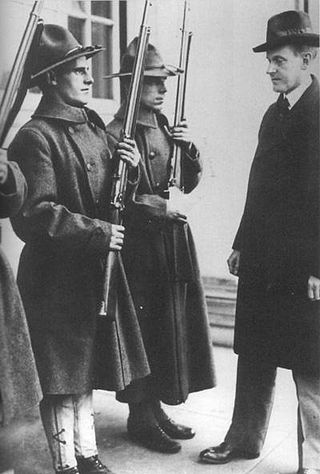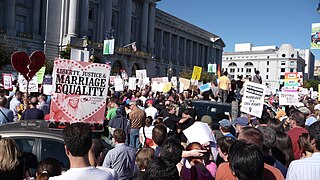
Calvin Coolidge was an American attorney and politician who served as the 30th president of the United States from 1923 to 1929.
Rights are legal, social, or ethical principles of freedom or entitlement; that is, rights are the fundamental normative rules about what is allowed of people or owed to people according to some legal system, social convention, or ethical theory. Rights are of essential importance in such disciplines as law and ethics, especially theories of justice and deontology.

A Theory of Justice is a 1971 work of political philosophy and ethics by the philosopher John Rawls (1921–2002) in which the author attempts to provide a moral theory alternative to utilitarianism and that addresses the problem of distributive justice . The theory uses an updated form of Kantian philosophy and a variant form of conventional social contract theory. Rawls's theory of justice is fully a political theory of justice as opposed to other forms of justice discussed in other disciplines and contexts.

Equality of outcome, equality of condition, or equality of results is a political concept which is central to some political ideologies and is used in some political discourse, often in contrast to the term equality of opportunity. It describes a state in which all people have approximately the same material wealth and income, or in which the general economic conditions of everyone's lives are alike.
Equal opportunity is a state of fairness in which individuals are treated similarly, unhampered by artificial barriers, prejudices, or preferences, except when particular distinctions can be explicitly justified. For example, the intent of equal employment opportunity is that the important jobs in an organization should go to the people who are most qualified – persons most likely to perform ably in a given task – and not go to persons for reasons deemed arbitrary or irrelevant, such as circumstances of birth, upbringing, having well-connected relatives or friends, religion, sex, ethnicity, race, caste, or involuntary personal attributes such as disability, age. According to proponents of the concept, chances for advancement should be open to everybody without regard for wealth, status, or membership in a privileged group. The idea is to remove arbitrariness from the selection process and base it on some "pre-agreed basis of fairness, with the assessment process being related to the type of position" and emphasizing procedural and legal means. Individuals should succeed or fail based on their efforts and not extraneous circumstances such as having well-connected parents. It is opposed to nepotism and plays a role in whether a social structure is seen as legitimate. The concept is applicable in areas of public life in which benefits are earned and received such as employment and education, although it can apply to many other areas as well. Equal opportunity is central to the concept of meritocracy. There are two major types of equality:

The Second Bill of Rights or Bill of Economic Rights was proposed by United States President Franklin D. Roosevelt during his State of the Union Address on Tuesday, January 11, 1944. In his address, Roosevelt suggested that the nation had come to recognise and should now implement, a second "bill of rights". Roosevelt argued that the "political rights" guaranteed by the Constitution and the Bill of Rights had "proved inadequate to assure us equality in the pursuit of happiness". His remedy was to declare an "economic bill of rights" to guarantee these specific rights:

The Boston police strike occurred on September 9, 1919, when Boston police officers went on strike seeking recognition for their trade union and improvements in wages and working conditions. Police Commissioner Edwin Upton Curtis denied that police officers had any right to form a union, much less one affiliated with a larger organization like the American Federation of Labor (AFL), which some attribute to concerns that unionized police would not protect the interest of city officials and business leaders. Attempts at reconciliation between the Commissioner and the police officers, particularly on the part of Boston's Mayor Andrew James Peters, failed.

The 1872 Republican National Convention was held in Philadelphia, Pennsylvania, June 5–6, 1872. President Ulysses S. Grant was unanimously nominated for reelection by the convention's 752 delegates. Massachusetts Senator Henry Wilson replaced sitting Vice President Schuyler Colfax as the Republican vice presidential nominee.

The Brave Little State of Vermont speech is a name given to remarks delivered by Vermont native and U.S. President Calvin Coolidge at Bennington on September 21, 1928. Coolidge was touring his home state by train to assess progress of recovery following the devastating 1927 flood. Considered taciturn and nicknamed "Silent Cal," Coolidge demonstrated unusual emotion in delivering his extemporaneous response to the human suffering and loss he had witnessed.

The Preamble to the Constitution of India presents the principles of the Constitution and indicates the sources of its authority. The preamble is based on the Objectives Resolution, which was moved in the Constituent Assembly by Jawaharlal Nehru on 13 December 1946 accepted on 22 January 1947 and adopted by the Constituent Assembly on 26 November 1949, coming into force on 26 January 1950, celebrated as the Republic Day of India. It was amended during the Indian emergency by Indira Gandhi where the words "socialist", "secular" and "integrity" were added.

The Boxer Indemnity Scholarship Program was a scholarship program for Chinese students to be educated in the United States, funded by the Boxer Indemnities. In May 25, 1908, the U.S. Congress Senate and House of Representatives passed the Joint Resolution to return to China the excess of Boxer Indemnity, amounting to over $11,961,121.76. Despite fierce controversies over returning the excess payment, President Theodore Roosevelt's administration decided to establish the Boxer Indemnity Scholarship Program to educate Chinese students in the United States. President Roosevelt recognized this program as a chance for "American-directed reform in China" that could improve US-China relations and raise America's standing in the world. Instead of copying European imperialism and using military means to reap a short-term financial gain, Roosevelt established the program to insure peace and trade in China in the "most satisfactory and subtle of all ways", while helping the United States gain respect and take a global leadership position.

The first inauguration of Calvin Coolidge as the 30th president of the United States was held on Friday, August 3, 1923, at the Coolidge Homestead in Plymouth Notch, Vermont, following the death of President Warren G. Harding the previous evening. The inauguration – the sixth non-scheduled, extraordinary inauguration to ever take place – marked the commencement of the first term of Calvin Coolidge as president. The presidential oath of office was administered to the new president by his father, John Calvin Coolidge Sr., who was a Vermont notary public and justice of the peace. On Tuesday, August 21, 1923, President Coolidge repeated the oath before Justice Adolph A. Hoehling Jr. of the Court of the District of Columbia at the Willard Hotel, Washington, D.C.

The United States Senate election of 1930 in Massachusetts was held on November 4, 1930. Incumbent Republican Senator Frederick H. Gillett did not run for re-election. In the open race to succeed him, Democratic Mayor of Fitchburg Marcus A. Coolidge defeated former U.S. Senator William M. Butler.

The second inauguration of Barack Obama as the 44th president of the United States was the 57th inauguration, marking the commencement of his second and final term, with Joe Biden as vice president. A private swearing-in ceremony took place on Sunday, January 20, 2013, in the Blue Room of the White House, followed by a public inauguration ceremony on Monday, January 21, 2013, at the West Front of the United States Capitol in Washington, D.C.

Social equality is a state of affairs in which all individuals within a specific society have equal rights, liberties, and status, possibly including civil rights, freedom of expression, autonomy, and equal access to certain public goods and social services.
The 1970 State of the Union Address was given by Richard Nixon, the 37th United States president, on January 22, 1970, to both houses of the 91st United States Congress. He said, "I say this not only because 1970 marks the beginning of a new decade in which America will celebrate its 200th birthday. The seventies will be a time of new beginnings, a time of exploring both on the earth and in the heavens, a time of discovery. But the time has also come for emphasis on developing better ways of managing what we have and of completing what man's genius has begun but left unfinished.

The 2016 State of the Union Address was given by the 44th president of the United States, Barack Obama, on January 12, 2016, at 9:00 p.m. EST, in the chamber of the United States House of Representatives to the 114th United States Congress. It was Obama's seventh and final State of the Union Address and his eighth and final speech to a joint session of the United States Congress. Presiding over this joint session was the House speaker, Paul Ryan, accompanied by Joe Biden, the vice president, in his capacity as the president of the Senate.

Calvin Coolidge's tenure as the 30th president of the United States began on August 2, 1923, when Coolidge became president upon Warren G. Harding's death, and ended on March 4, 1929. A Republican from Massachusetts, Coolidge had been vice president for 2 years, 151 days when he succeeded to the presidency upon the sudden death of Harding. Elected to a full four–year term in 1924, Coolidge gained a reputation as a small-government conservative. Coolidge was succeeded by former Secretary of Commerce Herbert Hoover after the 1928 presidential election.
Robert F. Kennedy's Law Day Address was delivered on May 6, 1961 to the students of the University of Georgia School of Law in Athens, Georgia. It was his first official speech as United States Attorney General outside the capital, and the first endorsement of the civil rights movement by the Kennedy administration. Kennedy used most of the address to talk about civil rights and how he planned to enforce them. He placed a heavy emphasis on the rule of law and the example the United States would be setting for the international community in the face of communism. Kennedy had spent a substantial amount of time preparing for the speech, which ultimately distracted him from the Freedom Rides that would test his resolve to ensure civil rights in its immediate aftermath.

The presidency of Calvin Coolidge began on August 2, 1923, when Calvin Coolidge became the 30th president of the United States upon the sudden death of Warren G. Harding, and ended on March 4, 1929.



















